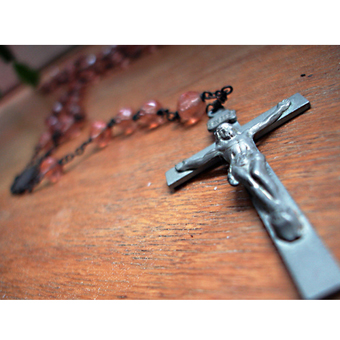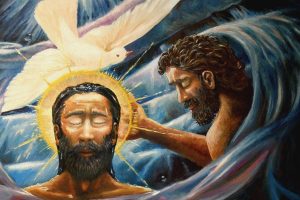Much to their parents’ surprise, a growing number of 20-somethings are embracing old parts of the Catholic tradition on their own terms.
He may be only 22, but Sam Dowd has already worn many hats in his parish, St. Mary’s in Holliston, Massachusetts: youth group member, service trip participant, maintenance guy, confirmation class teacher. A recent graduate of Sacred Heart University in Fairfield, Connecticut, last year he participated in a new program called ESTEEM (Engaging Students to Enliven the Ecclesial Mission), which aims to keep young adult Catholics engaged in church leadership roles after college.
Out on the West Coast, 19-year-old Michelle Herman has served as a lector, greeter, choir member, eucharistic minister, and office assistant at Blessed Sacrament Parish in Seattle. Currently an AmeriCorps volunteer who enjoys reading works by the church fathers, she plans to become a nurse because she’s motivated by the corporal and spiritual works of mercy.
Other millennials—those born after 1981—are similarly busy with church activities and religious pursuits. Consider Billy Cody, 21, whose love for eucharistic adoration grew out of his involvement with the St. Thomas More Society at Boston College, where he also got in the habit of attending daily Mass.
Sara Doan, 20, a vocal music major at the University of Wisconsin-Platteville, leads music at the St. Augustine University Parish 6 p.m. Sunday Mass and works in the church office during the week. She half-jokes that her interest in liturgy borders on “obsessive,” and last year she directed the music for the National Catholic Student Coalition’s annual conference.
Molly Clingingsmith, 25, works as an adoption coordinator for Catholic Social Services in Anchorage, and likes going to daily Mass a few times a week. “I definitely see a lot of involvement and passion in my generation,” she says.
Indeed, as a whole, church-going Catholics under 25 are surprisingly enthusiastic about their faith. Programs such as Steubenville Youth Conferences, Notre Dame Vision, and Life Teen summer camps regularly fill up and generate waiting lists; attendance at the most recent National Catholic Youth Conference, a biennial gathering of Catholic teens, exceeded expectations by several thousand.
Silent retreats for young adult Catholics sell out; slots on college spring break service trips fill up fast. They’re curious about prayer practices, the lives of the saints, and church teaching. And, thanks to a combination of factors, the way they practice their faith is something new and different—and sometimes perplexing for older Catholics, including their parents.
Exceptions to the rule
While these church-going Catholic millennials are excited and active in their faith, there is a catch—the description “church-going” weeds out a majority of youth and young adults who were baptized in the church. In fact, only 17 percent of millennials attend Mass weekly, according to the Center for Applied Research in the Apostolate (CARA).
CARA highlighted another sobering statistic last November on its blog: “Surveys have estimated the median age of a former Catholic to be 21. Thus, the poster-image for former Catholics . . . is a disaffected teenager.” This reality is even starker among white Catholics; Latino Catholics bolster the numbers a bit. Indicators such as these prompted Fordham University to host a two-day conference, “Lost? 20-Somethings and the Church,” which drew a full house in January to consider the troubled relationship between the Catholic Church and young adults.
For their part, Catholic teens are “particularly inarticulate about their faith” and “less likely to be religiously devoted than their Protestant counterparts” according to the highly regarded National Study of Youth and Religion (NSYR). Catholic youth scored lower than their Protestant peers on religious beliefs, practices, experiences, commitments, and evaluations on the NSYR survey.
In light of the data, it can be hard to see the silver lining—or even believe there is one. But Becky Eldredge, an adult faith formation catechist and retreat facilitator in Athens, Georgia, says she sees hope for the church in her role as partner program coordinator with Charis Ministries, a Jesuit ministry to young adults, and at the Catholic campus ministry at the University of Georgia. While she doesn’t dispute the accuracy or significance of the various data, she’s not jumping on the doomsday bandwagon. “I’ve met too many young adults that challenge me [to think about those survey results differently]. I’m not talking about one or two individuals—I’m talking about hundreds.”
Statistically, church-going Catholic millennials might seem more serious and fervent about their faith than either of the preceding two generations, baby boomers or generation X. For instance, according to CARA, they’re more likely to believe in the real presence of Christ in the Eucharist than boomers or Xers. And millennials who are part of a parish say that they are “somewhat” or “very” involved in parish or other religious activities at a higher level than other generations.
Sam Dowd fits that “very involved” description now, but according to his dad, Bill Dowd, “Sam was a pretty typical pre-confirmation teenager who could take church or leave it.” Sam agrees, and remembers how his attitude began to shift when he was preparing for confirmation. “I went from struggling with my parents every Sunday to getting up and driving myself to Mass. I was making it my commitment. I was choosing the church.”
He credits his high school job doing maintenance at his parish with his transformation. Seeing the day-in and day-out activities of the parish staff, he says, really opened his eyes. “I realized that church is not just about Sunday—it’s about all seven days.”
Now, he says, “One of my priorities is really knowing and understanding my faith.” When he hears about a church teaching he’s unfamiliar with, he looks it up. And he particularly enjoys talking with his dad, who, as Sam got more involved at St. Mary’s, also became more involved, eventually serving on the parish council, teaching CCD, and going on a mission trip.
While Sam connected with his faith through his job at the parish, his two younger siblings, 19-year-old Chris and 16-year-old Meredith, experienced a similar shift through Gospel Road, a local service retreat run through their parish. Their father appreciates how this service experience has nurtured an awareness of the world and a connection with other Catholics, and one other outcome that fellow Catholic parents would welcome: “From the moment that program ended, getting them to go to Mass was not a struggle at all,” he says.
Authority rules
The popularity of service programs has soared in recent decades, and millennials who participate in these activities, whether for a day, a week, or a year, sometimes cultivate a sacramental spirituality that connects back to the Mass.
“The celebration of Mass and the Eucharist is central to my faith as a Catholic,” says Molly Clingingsmith, who belongs to St. Patrick’s Parish in Anchorage and also attends Mass and events at Holy Family Cathedral. “I think it’s the consistency of knowing what I get when I walk in the church, and knowing it’s always going to be there.”
Clingingsmith’s reason may not sound much different from something her parents or grandparents might say, but it comes from a distinct millennial perspective.
In his book Googling God (Paulist), Mike Hayes, a young adult minister who co-founded the website Busted-Halo.com, says millennials developed generationally specific traits in response to world events that occurred during their formative years: 9/11 especially, but other happenings such as Hurricane Katrina and the War on Terror also contributed to millennials being more supervised, more concerned with security and order, and more trusting of authority than the two preceding generations.
In general, Hayes writes, millennials have a high regard for authority, structure, and loyalty to tradition; an appreciation for service; and, among the churchgoing crowd, a longing for the church to be a place of mystery, silence, and transcendence; a desire to prove their worthiness through repentance; and “a rigid adherence to the laws of the church as stated in the catechism.”
Kyle Eilenfeldt found those generalizations spot-on when he was working as a pastoral associate for young adult faith formation at a parish in Cherry Hill, New Jersey. At a diocesan young adult retreat he helped to organize, he found participants preferred attending daily Mass to open-ended spiritual discussion—something that would likely have been different for gen X or baby boom retreatants.
“The majority were very committed to the authority of the church, to abiding by church rules and structure,” he says. And they are attracted to practices such as eucharistic adoration and the rosary, he believes, because these practices are distinctively Catholic rather than universally Christian.
Sister Karen Lueck, a Franciscan Sister of Perpetual Adoration (FSPA) who works with new members of her community in her job as co-minister of incorporation, points to one common reality that often drives millennials to more contemplative, traditional prayer forms: the constant stream of communication they sustain each day. Meditative prayer is one of the few opportunities millennials take to turn off the cell phone and forget about Facebook. “It’s a place of silence and mystery, a way to be in touch with God that they can’t experience elsewhere,” she says.
Billy Cody sums it up: “I love adoration so much because it engages all of the senses, yet it’s very silent and it gives me time to clear my head.”
Even though some young Catholics gravitate to “retro” religious practices like adoration, it doesn’t necessarily mean they desire a more conservative form of Catholicism. “I think they’re just embracing the parts of the Catholic tradition that work for them,” says Eldredge.
She recognizes a conservative slant among young adults she works with, but it’s typically combined with a desire to learn more about the faith. “If young people are passionate about adoration, it opens up an avenue for conversation,” she says. “It gives them an opportunity to articulate their faith, and for fellow Catholics maybe to say, ‘Sure, Christ is there, but where else is Christ present in your life?’ ”
Some critics dismiss that “what-works-for-me” approach as a sign of millennials’ pervasive consumer mentality, but Eldredge believes the situation is more nuanced. “They really are seekers,” she says, and she observes millennials curious about prayer practices as well as saints and other holy people.
Pope John Paul II enjoys great popularity among this generation, despite the fact that the oldest millennials weren’t even teenagers when World Youth Day came to Denver in 1993. “Catholics my age still look to him as a hero, especially because of his focus on the youth,” says Cody, who was in high school when John Paul II died. “I’ll always remember watching the television coverage of his funeral, and how strange it felt when we started praying for a new pope at Mass.”
There’s a positive side to both the tumultuous world events and the nonstop communication that have marked the millennial experience: “This particular generation of young people is the most family-friendly generation in decades,” says Michael Theisen, author of FaithSharing for Teens: 25 Experiences That Connect Faith and Life (St. Mary’s Press) and director of membership services at the National Federation for Catholic Youth Ministry. Compared to boomers and their parents, millennials and their parents experience a much narrower generation gap. Teens are much more receptive to doing things with their families than they were a generation or two ago, Theisen says, and the phenomenon of helicopter parents and boomerang kids supports this idea as well: “If millennials didn’t have a certain level of comfort with their parents, they’d find someplace else to go.”
It skips a generation
But even if millennials and their parents have a great relationship, there’s still a natural separation that happens during adolescence and young adulthood. It’s part of identity formation, and it plays out in religious identity and practice.
Of the many ways for youth and young adults to grow in their faith, Theisen says, one of the most important is the chance to experience faith within the context of one’s peers in addition to one’s family of origin. From there, young adults gain a new perspective on their spiritual gifts and inclinations. “The goal is to develop their own faith so they can own it and share it,” says Theisen. “They have to name it and claim it for themselves.”
Sara Doan’s family was “always involved” at Immaculate Conception, their small, rural parish in Truman, Wisconsin, where her dad belongs to the Knights of Columbus and her mom belongs to the altar society. During her freshman and sophomore year of college she continued to go back for Mass on Sundays. When she started attending St. Augustine’s University Parish in Platteville, a big part of the draw was the sense of community she found by celebrating Mass with her peers.
“I’m fortunate to be in a place like St. Augustine’s, where so many people are passionately Catholic,” she says. The campus church has given her a chance to explore and grow into her own faith and preferences in a way that wouldn’t have been possible at her home church. “It’s very easy to be fervent about my faith here because I have the support of peers who believe the same things and are going through similar experiences.”
Also important to this developmental phase is the “whatever my parents didn’t do is interesting” dynamic. The fact that this generation is interested in reviving some faith practices that may have skipped a generation or two makes sense on a few levels, Theisen says. It’s reflective of the more conservative direction the church has moved in recent decades, it stands against certain aspects of popular culture, and it’s an opportunity to engage their contemplative side in a new-to-them-yet-traditional structure.
With millennials, there’s also a high level of interest in the mystical, transcendent dimensions of faith, according to the NSYR study—perhaps in response to the more communal focus that emerged after Vatican II.
Not your parents’ faith
But even in the middle of that identity formation process, experts say—and millennials confirm—that parents are still the most important factor in the faith development of their teenage and young-adult sons and daughters.
“There’s not much we disagree with,” says Michelle Herman of her mom. “The faith foundation she gave me was very powerful and allowed me to make my own decisions.”
In some of the Charis retreats that Becky Eldredge directs, she asks participants to share an object that symbolizes their Catholic faith. She estimates that 90 percent have something to do with their parents. “If it’s a rosary, they don’t explain what a rosary is so much as how their mom gave them this particular rosary for their first communion.”
Likewise, when she produced a video documenting the “small saints” in the lives of young adults, the number one choice—by a landslide—was mom or dad. “Parents model how to live their faith, and young adults are watching them more than they know,” she says.
That doesn’t mean, however, that youth and young adults don’t sometimes confound their parents with their faith practices or development. For instance, the outspoken zeal of a teenager recently returned from a service trip can be jarring for parents whose most radical expression of faith is showing up for Mass every Sunday.
“They may be thinking, ‘Is this the kid who fights me to go to church every week?’” says Theisen. But he encourages parents to take heart. “Our faith is a big faith, and there are lots of ways to live it out and pray and celebrate it.” He also advises parents to ask questions about the experience and really listen rather than just taking the opportunity to roll their eyes at their kid’s sudden fervor. “Youth and young adults should have more opportunities to be agents of evangelization rather than just objects of evangelization,” says Theisen.
But there is one difficult aspect of the millennial Catholic experience, and it concerns churchgoers and non-churchgoers alike. “Today it seems young people feel like they can choose their involvement, that they can take church teachings as advisory, whereas young people back in 1960 didn’t,” says Bill Dowd.
For instance, while his older daughter is not a practicing Catholic, his son Sam is a regular Mass attendee. Dowd believes it’s because his son appreciates the spirituality and camaraderie at Mass rather than because he is required as a Catholic to attend. While earlier generations focused on “Lord, I am not worthy,” Bill Dowd says Sam’s thinking would probably be more, “Lord, I do a lot for you, and I get a lot out of this.”
Sam doesn’t dispute that critique. “The church tells us that Mass is crucial to our salvation, but that’s not why I go. Mass is a reminder of why I am Catholic. My favorite part of the Mass is the Nicene Creed when we state our beliefs. I go to Mass to proclaim to the community that I am Catholic. I go to Mass to experience my community, to stand up with my brothers and sisters in Christ and remind myself and ourselves what we believe in. So that when the priest says, ‘The Mass is ended, go in peace,’ I know that means that Mass is over, now it’s my turn to go out and show the world on my own.”
Duty free
That distinctive shift—a faith motivated primarily by inspiration, delight, or devotion rather than duty—means that millennial Catholics who practice their faith may have greater fervor but definitely are fewer in number than past generations. And that can be challenging: “At times it’s hard to live a faith-infused life when the majority of my generation could not care less,” says Herman. “There’s a lot of moral relativism and general apathy toward religion.”
Bill Dowd wonders if the enthusiasm of a small minority of millennials will be enough to keep the church on course in the decades ahead. But he recognizes the particular promise of young, faithful millennials when he thinks back to his own confirmation class—none of his classmates remained involved in the Catholic Church after they graduated from high school. It was only when they got married or had kids that they returned to the church. Even for himself, “After I graduated, going to Mass was not that big a deal for me because I didn’t have that kind of internal commitment that Sam has.”
“Today there are young adults who want to become more involved in their faith and incorporate it into all aspects of their life,” says Eldredge. That’s good news on many fronts—millennials tend to be more conscious of the environment, technology, the universal church, and of suffering in the world.
“As a generation, we’re more globally aware than our parents’ generation,” says Doan. “That’s something great my generation can offer, even though we’re young.” And it’s something that will lead Catholic millennials to live out their religious convictions in all kinds of ways, introducing older generations—and the rest of the church—to new, unexpected faith frontiers in the process.
This article appeared in the September 2011 issue of U.S. Catholic (Vol. 76, No. 9, pages 24-29).













Add comment